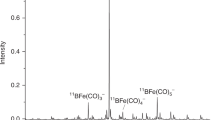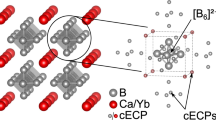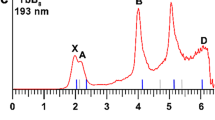Abstract
As is well known in the series of the isoelectronic molecules N2, CO and BF, nitrogen and carbon monoxide show a close similarity not only in their chemical but also in their spectroscopic properties, that is, in the structure of their excited states. The ground-state of both N2 and CO is saturated (1∑) and both have systems of analogous singlet and triplet levels. However, the data hitherto recorded of BF, the least symmetrical of the above-mentioned molecules, show no evident similarity, and therefore it has been suggested in the tables of Herzberg and of Gaydon1 that the ground-state of BF had escaped observation.
This is a preview of subscription content, access via your institution
Access options
Subscribe to this journal
Receive 51 print issues and online access
$199.00 per year
only $3.90 per issue
Buy this article
- Purchase on Springer Link
- Instant access to full article PDF
Prices may be subject to local taxes which are calculated during checkout
Similar content being viewed by others
References
Herzberg, "Molekülspektren" (1939). Gaydon, "Dissociation Energies" (1947).
Miesher, Helv. Phys. Acta, 8, 279 (1935).
Douglas, Canad. J. Res., A, 19, 27 (1941).
Author information
Authors and Affiliations
Rights and permissions
About this article
Cite this article
CHRÉTIEN, M., MIESCHER, E. New Electronic Band-Systems of Diatomic Boron Compounds (BF, BO and BH). Nature 163, 996–997 (1949). https://doi.org/10.1038/163996a0
Issue Date:
DOI: https://doi.org/10.1038/163996a0
This article is cited by
-
Ultra-Violet Band-Systems of CF
Nature (1950)
Comments
By submitting a comment you agree to abide by our Terms and Community Guidelines. If you find something abusive or that does not comply with our terms or guidelines please flag it as inappropriate.



